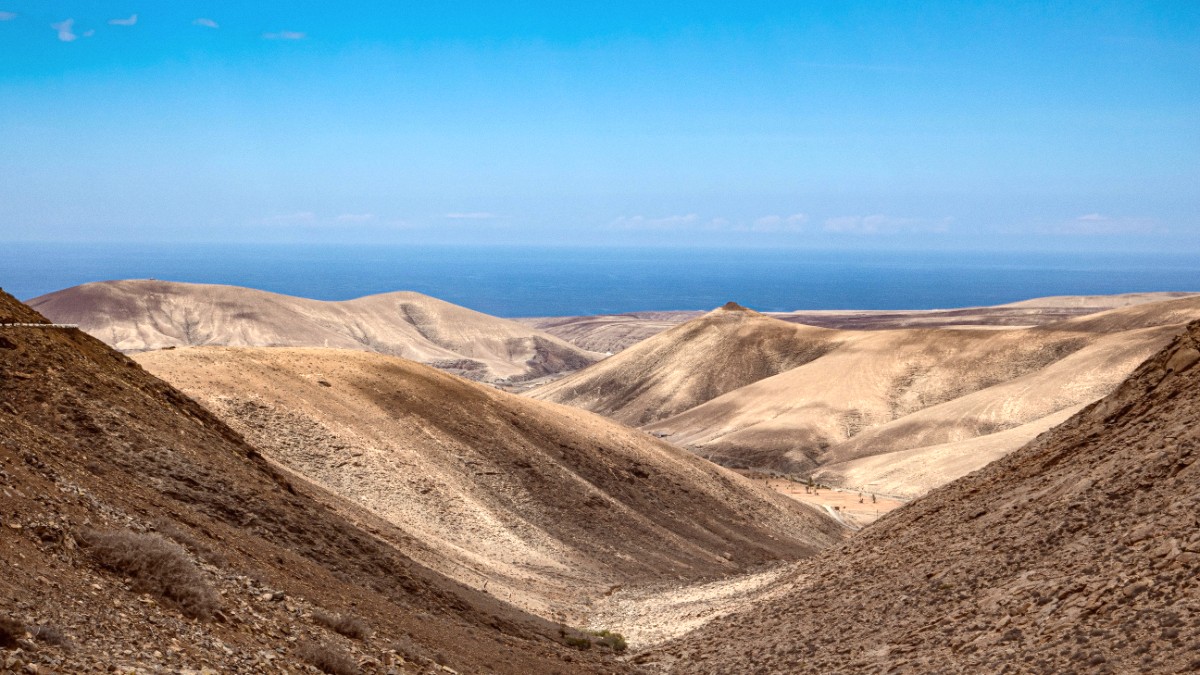
Fuerteventura, Canary Islands
Fuerteventura has comfortable temperatures. It is also known for consistent trade winds. These winds cool the air, making even summer heat comfortable, and create ideal conditions for wind-powered water sports.
Humidity stays generally low, making for overall comfort.
Fuerteventura has its nickname, "the island of eternal spring," due to its consistently comfortable temperatures. It is also known as "the island of wind" because of the consistent trade winds.
These winds cool the air, making even summer heat pleasant, and create conditions for wind-powered water sports.
July-August, Dec-Jan, Easter
Hottest weather, lively atmosphere, all tourist facilities operational. Great for summer holidays and festive celebrations.
Higher prices for flights and accommodation. Attractions and beaches can be crowded.
April-June, Sep-Nov
Comfortable temperatures. Better value for money on flights and lodging. Ideal for outdoor activities. Strong winds for water sports.
Winds can be strong, especially late spring and early summer, not for everyone during beach relaxation.
Feb-March (exc. Easter)
Mildest temperatures, escape from cold winters. Lowest prices for travel. Few crowds for relaxed exploration.
Evenings are cooler, with a slightly higher chance of light rain. Some smaller facilities may have reduced operating hours.
For windsurfing and kitesurfing, visit from May to August for the strongest and most consistent winds. General beach relaxation and swimming are best from June to October, when sea temperatures are warmest.
Hiking and cycling are best from October to May. These months have cooler, more comfortable temperatures for exploring inland trails. Spring and autumn are good for birdwatching, as migratory birds pass through the island.
May to August for peak wind conditions.
June to October for the warmest sea.
October to May for cooler temperatures.
Spring and autumn for migratory birds.
Low season offers fewer crowds and mild conditions.
Travelers to Corralejo, Fuerteventura, comply with Spain's visa and entry rules, as the island is part of Spain and the Schengen Area.
Citizens from countries like the USA, Canada, Australia, and the UK (post-Brexit) do not need a visa for stays up to 90 days within any 180-day period. A valid passport suffices.
Keep these documents ready for entry. Always check the embassy guidelines for exact specifications regarding photos and applications.
The local currency is the Euro (€).
Euros are used throughout Fuerteventura. ATMs are widely available in Corralejo, found at major banks as well as in shopping centers. Credit and debit cards are broadly accepted.
Tipping is not mandatory in Corralejo but has appreciation for good service. It is a gesture of appreciation, not an expectation.
Enjoy free activities like beaches, dunes, volcanic trails, and local markets without entry fees. Staying hydrated can be economical too.
Before traveling to Corralejo, review health and safety information to help a pleasant trip. The Canary Islands are a safe destination, but preparation is wise.
Fuerteventura has a high UV index. Stay hydrated by drinking plenty of water. Accidents can occur from rocks or coral when swimming. Jellyfish occasionally appear, especially in warmer months. Stings are usually mild.
If you plan boat trips, consider bringing motion sickness medication.
Fuerteventura has a high UV index. Apply sunscreen regularly, even on cloudy days. Wear hats, sunglasses, and protective clothing. Stay hydrated.
Use High-SPF sunscreen (SPF 30+ recommended).
Avoid direct sun exposure during peak hours (12 PM to 4 PM).
Accidents can occur from rocks or coral when swimming. Jellyfish occasionally appear; stings are usually mild. Mosquitos are present but generally not a major issue.
Carry a Basic first aid kit with antiseptics.
A mild Insect repellent can be useful for evenings.
If boat trips are planned (e.g., to Isla de Lobos), consider bringing motion sickness medication. The dry climate and sun can lead to dehydration.
Motion sickness medication is available.
Drink water frequently throughout the day, especially when active.
| Service | Information | Note |
|---|---|---|
| Emergency Number | Dial 112 for all emergencies: ambulance, fire, police. | Free to call, covers entire Canary Islands. |
| Hospitals | Main island hospital: Hospital General de Fuerteventura, Puerto del Rosario (35 km south). | Corralejo has smaller clinics (Centro de Salud) and private medical centers. |
| Pharmacies | Recognized by a green cross sign. Widely available, offer OTC and prescriptions. | Pharmacists can advise for minor ailments. |
Know these numbers for swift assistance.
Police, Fire, Ambulance (covers entire Canary Islands).
For local incidents.
For more serious crime reports.
Lost or Stolen Documents
Report loss or theft to the local police (Policía Nacional) first. Obtain a police report. Then, contact your embassy or consulate for emergency travel documents.
For medical emergencies, call 112 or go to the nearest Centro de Salud or private clinic. For serious conditions, proceed to Hospital General de Fuerteventura in Puerto del Rosario.
Always carry copies of your passport and documents separately.
For rural areas and highways.
Keep contact details handy for emergencies.
Have their 24/7 emergency contact number available.
While Corralejo is safe, taking these precautions helps you stay prepared for any situation.